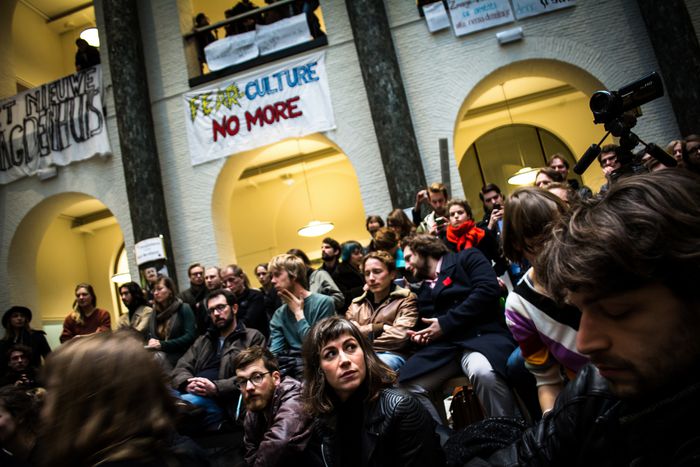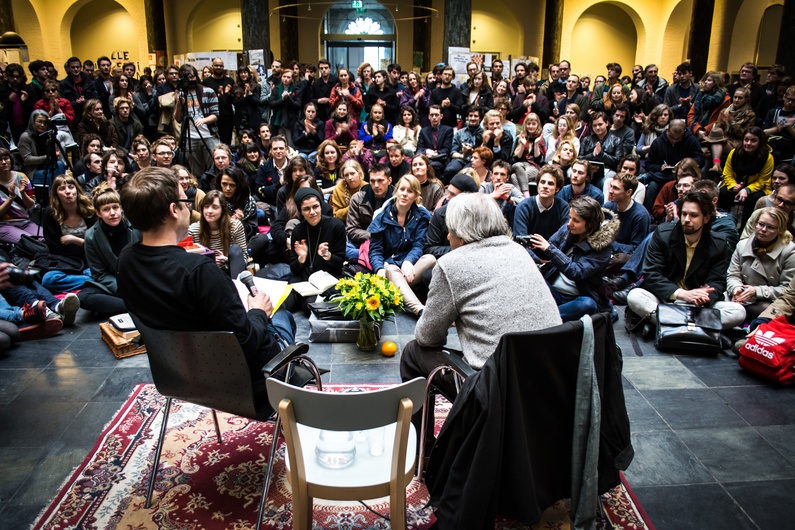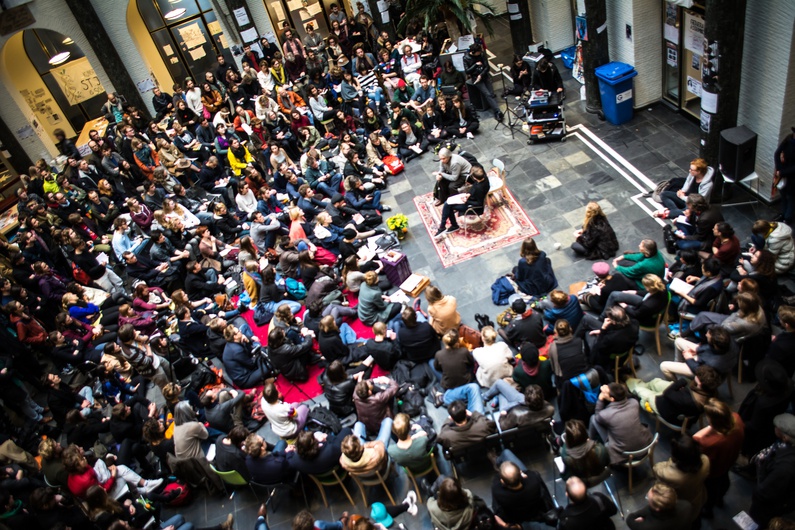
In the heart of Amsterdam’s student occupation
Published on
A new wave of student movements and occupations of university buildings is taking place around Europe.
In Amsterdam, on March 25th, the movement Nieuwe Universiteit celebrated the first month of occupation of the Maagdenhuis, an administrative building of the Universiteit van Amsterdam located in Spui, a square in the city centre.
A group of students have been living in the Maagdenhuis building for over a month now. They have been organising a whole range of activities, from lectures and workshops, to presentations with local and international intellectuals supporting the protest movement. They are demanding direct democracy, participation in the management process, the halt of budget cuts and of the progressive corporatisation of the university.
University student movements rising up around Europe are proof of one of the most important issues of our time: the crisis of knowledge. It is when knowledge is unchallengeable and indisputable that people feel disconnected from the world they live in, and from the contribution they themselves are aiming to give to society.
Absence of an agora
Education is a window to the world, it should trigger curiosity and offer the keys for people to dream, to be creative and inspired in envisioning the world where they desire to live in. However, when universities are condemned to reflect the structures of the current economic and highly bureaucratic financial system, no sincere space (i.e. an agora) for dialogue and critical confrontation can sincerely develop, no challenging narratives can be explored. No alternatives for this topical phase of human history can be wisely drawn.
In this gloomy scenario groups of students inspired by fresh ideals and disillusioned by the perspective of the present, chose to react by occupying some university buildings in protest against the commercialisation of educational institutions. On 13th of February, academics and students of the Nieuwe Universiteit occupied the art deco Bungehuis building in response to the reforms of the University van Amsterdam (UvA).
After negotiations with the Board of Directors failed, the occupiers who refused to leave the building were evicted by the police. That same night, a group of students forced the door of the Maagdenhuis, the main UvA's administrative building placed in the heart of the city, and started the occupation that is currently ongoing.
The movement's goals are pursued through practices of direct democracy and self-organisation. In their pamphlet and self-published magazine Antithese, students and academics behind the Nieuwe Universiteit movement in Amsterdam affirm how during the occupation "we were finally ridding ourselves of a sort of postmodern cynicism”. In this sense, taking action and occupying is a reaction to "the growing apathy of the televised youngest generations who did internalise a feeling of powerlessness."
Liberation instead of occupation
The logic of the system is to produce people who are "unable and feel that they are unable and that agree that they are unable” affirms Jacques Rancière, the French philosopher who spoke at the Maagdenhuis last Wednesday. In this first month of activities at the Maagdenhuis, the movement has hosted workshops, feature films and documentaries screenings, as well as music concerts and daily lectures with professors and intellectuals such as anthropologist David Graeber, who was involved in the Occupy movement.
 Nicola Zolin's Twitter account
Nicola Zolin's Twitter account
During these weeks, the word ‘occupation’ has rather been replaced by the Nieuwe Universiteit with the word ‘liberation’. On the pages of the pamphlet Onruststoker, a member of the movement, acknowledges the lack of a concrete plan for the future. According to him, “the negation of what is by no means a final stage” can be pursued through creative freedom that “animates our ideals, rough, subjective and diverse as they may still be, into experiments”.
“We are not only occupying this space”, affirms Michiel, a student who joined the movement after the occupation of the Maagdenhuis had begun. “We have started feeling a part of a big family as new occupations are happening elsewhere”.
A domino effect from Amsterdam to London
The news of the occupation of an administrative building at the London School of Economics in London on March 18th brought new confidence to the students in Amsterdam. From London, the occupiers explain that "the power of occupations is that they create a domino effect: this is only the beginning.” A few weeks earlier in Canada, students had started a strike at both York and Toronto universities, lamenting the insufficient and unequal allocation of resources to course instructors and teaching assistants.
The students in Amsterdam are confident that their demands will be listened to. “One of the demands is the end of real estate speculation on money that is supposed to be for research and teaching” affirms Joyce Pijnenburg, former student of UvA who has renounced a career in academia due to the malfunctioning that she is now denouncing.
 Nicola Zolin's Twitter account
Nicola Zolin's Twitter account
“In 1969, the government listened to the students and changed the governance of the university by means of law”, recalls Michele Mugia, a philosophy student at the UvA and an activist since the beginning of the occupations. He has spent most of his time organising events and meetings during the month of occupation and he is proud to affirm that “everyone here believes they have written history and future at the same time.”
Bertie Kaal is a teacher at the UvA. She supports the struggle of the Nieuwe Universiteit and recalls how “the achievement of the occupation of the 1969 were lost in the following decades, as the top-down system gradually turned dominant”. She explains how the most of the teachers are now afraid to protest, fearing to lose their jobs. “I am happy that the students are protesting also because the professors aren’t doing it”, she continues.
The students behind the Nieuwe Universiteit are united and determined to not be afraid. According to Micheil, another student of the occupying collective, “other movements and political parties have gotten inspiration from us, and the sense of what is possible if you start acting and creating what you believe you stand for. That’s what we’re seeing happening here.”



